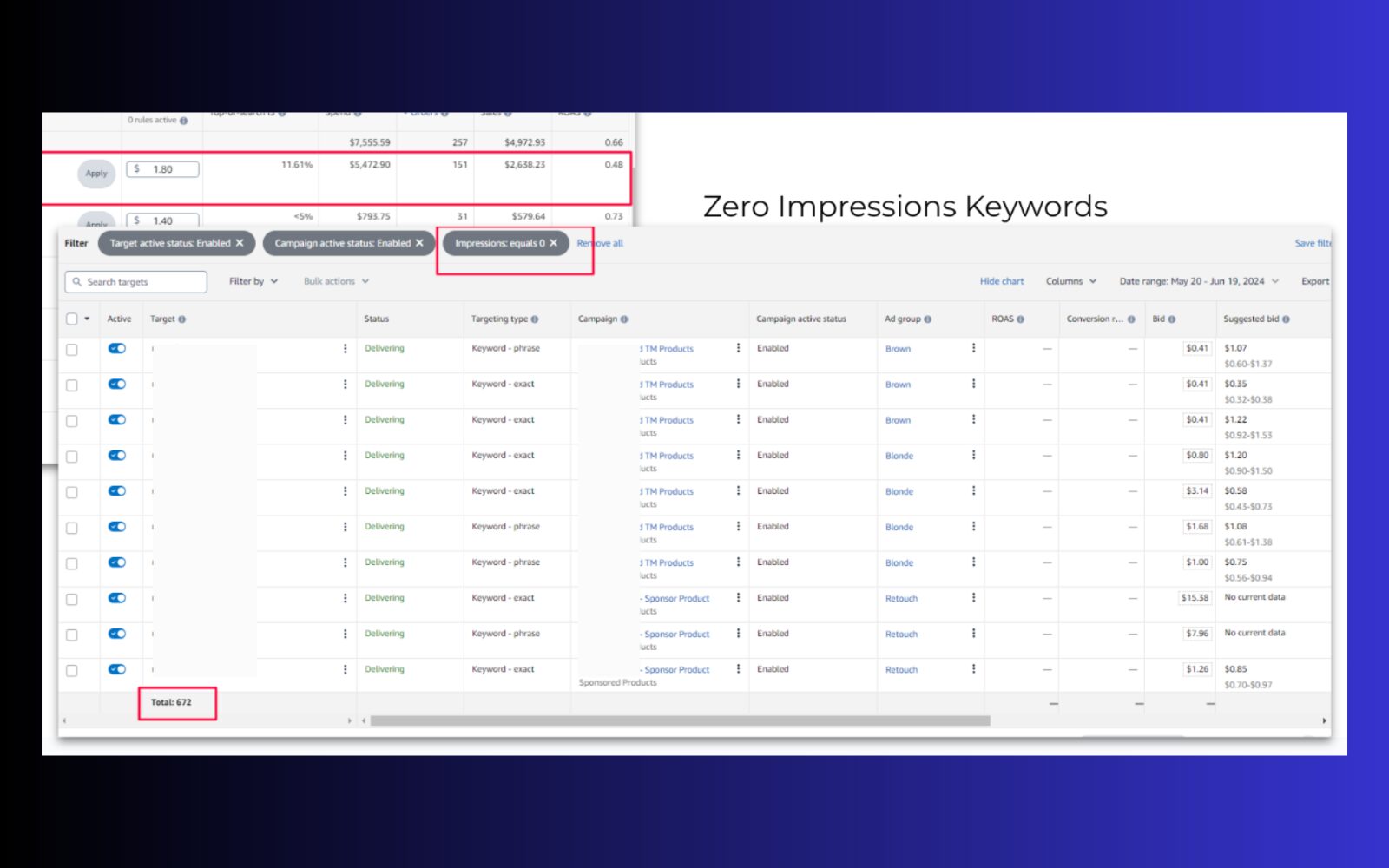Amazon Advertising
Low-Impression Keywords Are Killing Your ROI—Here’s How to Solve It

Welcome to our Amazon Audit series, where we pull back the curtain on common mistakes and missed opportunities we frequently see in brand campaigns. If you’re unfamiliar with an Amazon audit, think of it as a thorough check-up on your advertising performance. Our audit team regularly reviews the campaigns of top brands, identifying critical mistakes that hold your ads back and best practices that drive success. One issue we often uncover is a silent killer: strategically relevant keywords with little to no impressions. This is a widespread problem, and in this post, we’ll explain why it happens and how to fix it.

Learn How to Make Listings That Convert in 2025!
Read our step-by-step guide on how to optimize your listings using Rufus AI insights. Sign up for our newsletter and get your copy for free!
Show me howThis week, during the campaign analysis, we discovered one common thread in many of our Amazon PPC management audits: hundreds of highly relevant keywords but 0 impressions. For example, a hair dye product had the term “brown hair dye” in a campaign with over 75 additional targets, yet that term wasn’t getting a single impression, whether in broad, phrase, or exact match.
Low-Impression Keywords: The Silent Budget Killer
Imagine having the perfect product, but no one knows it’s there. That’s exactly what happens when your Amazon campaigns are full of low-impression keywords. These keywords are relevant, but for some reason, they’re not getting the visibility they deserve—resulting in wasted potential and wasted budget.
Our audits often reveal campaigns with hundreds of keywords, but only a handful are pulling in impressions. So, what about the rest? These missed opportunities can quietly drain your ad spend without giving you any meaningful return. And if you’re not paying attention, you could be throwing money at keywords that just aren’t being seen.
Why You Can’t Afford to Ignore These Keywords
Leaving strategically relevant keywords unchecked can have a huge impact on your campaign’s performance. Think of it like this: low-impression keywords are highly relevant to your product, but they’re stuck in the shadows, not getting the visibility they deserve. It’s like owning a luxury sports car but leaving it parked in the garage—wasting its potential while competitors zoom by.
Here’s why ignoring low-impression keywords hurts your brand:
- Wasted Budget: You’re spending money on keywords that aren’t getting seen, essentially burning through your ad spend with no return.
- Lost Market Share: Every missed impression is a missed opportunity for visibility. If potential customers aren’t seeing your ads, they’re buying from competitors.
- Misleading Data: Inexperienced analysts might assume low-impression keywords aren’t relevant, but the reality is that they might just need higher bids or better segmentation to perform.
- Missed Opportunities: Some low-impression keywords generate significant Amazon search volume. If they aren’t getting impressions, you could be losing out on valuable traffic that could convert into sales.
By overlooking these keywords, you’re leaving potential sales on the table. Regular keyword audits and adjustments—like increasing bids or creating dedicated campaigns—can turn these hidden opportunities into real drivers of performance.
How to Spot Zero-Impression Keywords and Fix Them
After identifying the problem of low-impression keywords, the next step is knowing how to find them in your campaigns and take action. Zero-impression keywords silently drain your ad budget by failing to generate visibility or clicks. But with a few simple adjustments, you can turn them into valuable assets.
Here’s how to uncover and fix these zero-impression keywords:
- Use Filters in the Amazon Ad Console:
Navigate to the Amazon Ad Console and apply the following filters: [Target Active Status: Enabled], [Campaign Active Status: Enabled], and [Impressions = 0]. This will give you a clear view of which active keywords are receiving no impressions.
- Adjust Your Bids:
Low bids are a common culprit. Once you’ve identified the zero-impression keywords, check the suggested bid ranges in the Ad Console. Increase the bids on those terms to make them more competitive and give them a better chance at generating impressions. - Narrow Your Campaign Focus:
Sometimes, the issue is too many keywords in a single campaign. Break down campaigns with hundreds of targets into smaller, more focused groups. Ensure that each campaign targets no more than 25-30 keywords. This allows Amazon’s algorithm to allocate budget more effectively, giving each keyword a better chance to perform. - Review Keyword Relevance:
Lastly, make sure the keywords are truly relevant to your product and audience. If they’re not aligned with shopper intent, no amount of bid adjustment will help. Use Amazon keyword tools to ensure you’re targeting the right terms.
Of course, keyword management doesn’t stop with optimizing your bids or finding zero-impression keywords. Two critical strategies to take your Amazon campaigns to the next level are keyword harvesting and negative keyword optimization. By regularly harvesting new, high-performing keywords, you can continuously grow your campaign’s reach and profitability. On the other hand, using negative keywords ensures you’re not wasting budget on irrelevant searches.
Is Your $25k Ad Budget Delivering Results?
If you’re spending $25k or more on Amazon ads each month, you can’t afford to let wasted budget drag down your performance. Our free Amazon audit is specifically designed for brands with significant ad spend, helping you uncover hidden inefficiencies and missed opportunities that could be costing you thousands. Our team of Amazon experts will provide in-depth insights into where your budget is being wasted and show you exactly how to optimize your campaigns for better ROI. Stop letting your ad dollars slip through the cracks—sign up for your free audit today and start maximizing every dollar you invest!
LET’S DISCOVER WHAT’S POSSIBLE FOR YOUR BRAND
We’re here to listen and uncover opportunities tailored to your unique goals.
Fill out the form to get started, and you’ll walk away with real insights and actionable recommendations—whether we work together or not.
- HANDS-ON LEADERSHIP
- AWARD-WINNING PARTNERSHIPS
- CUSTOM-BUILT SOLUTIONS




